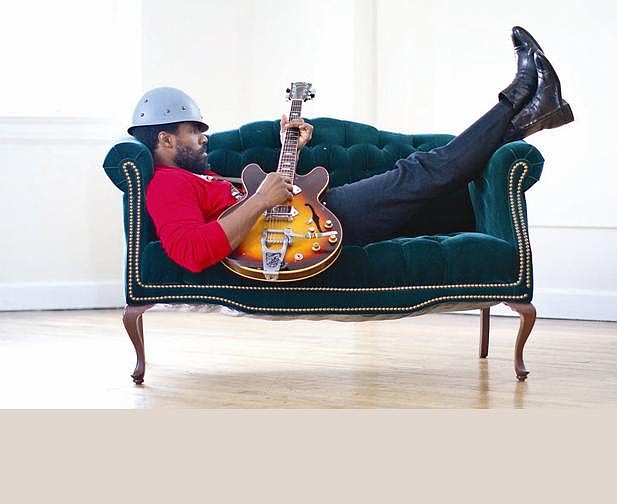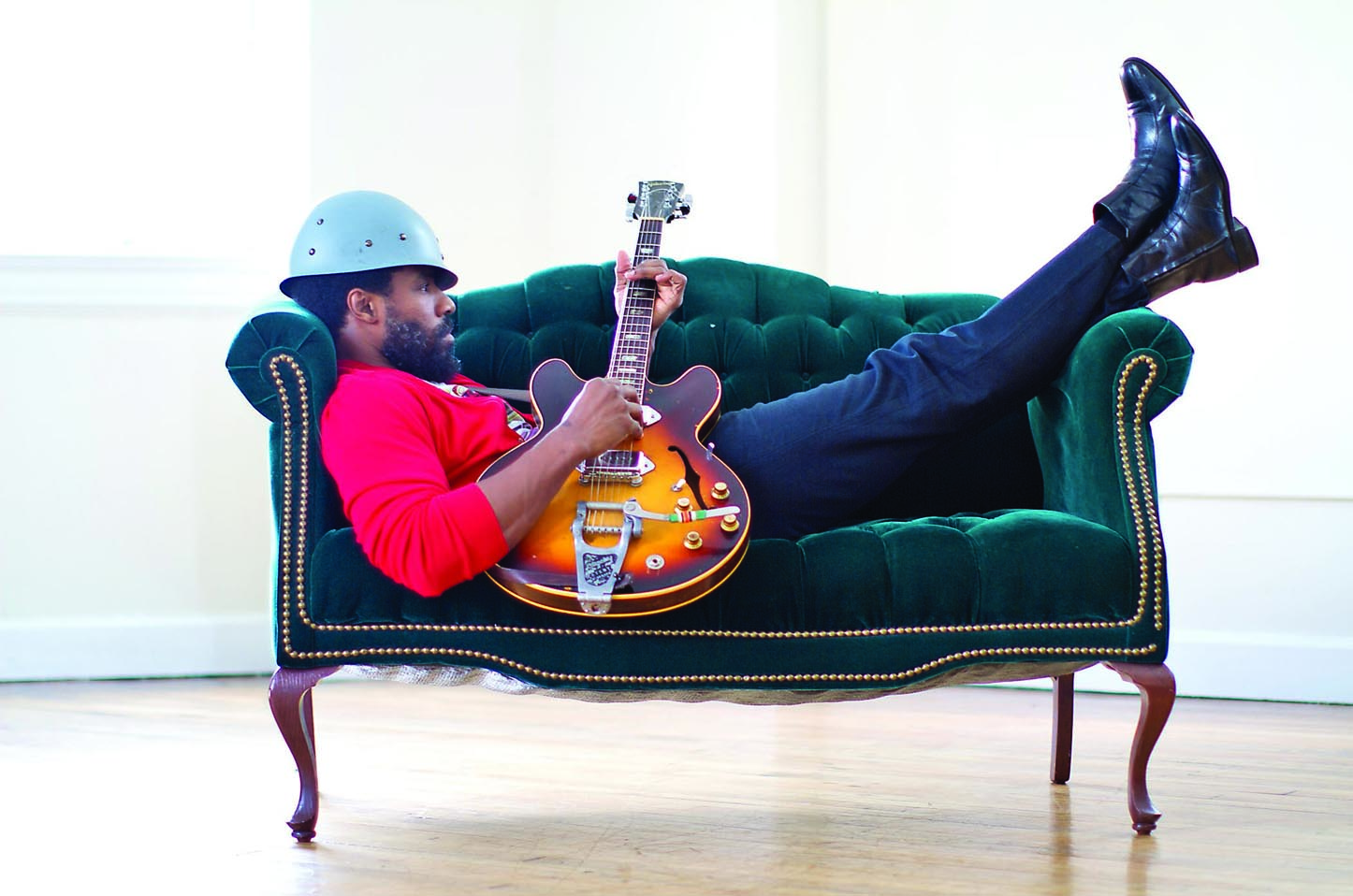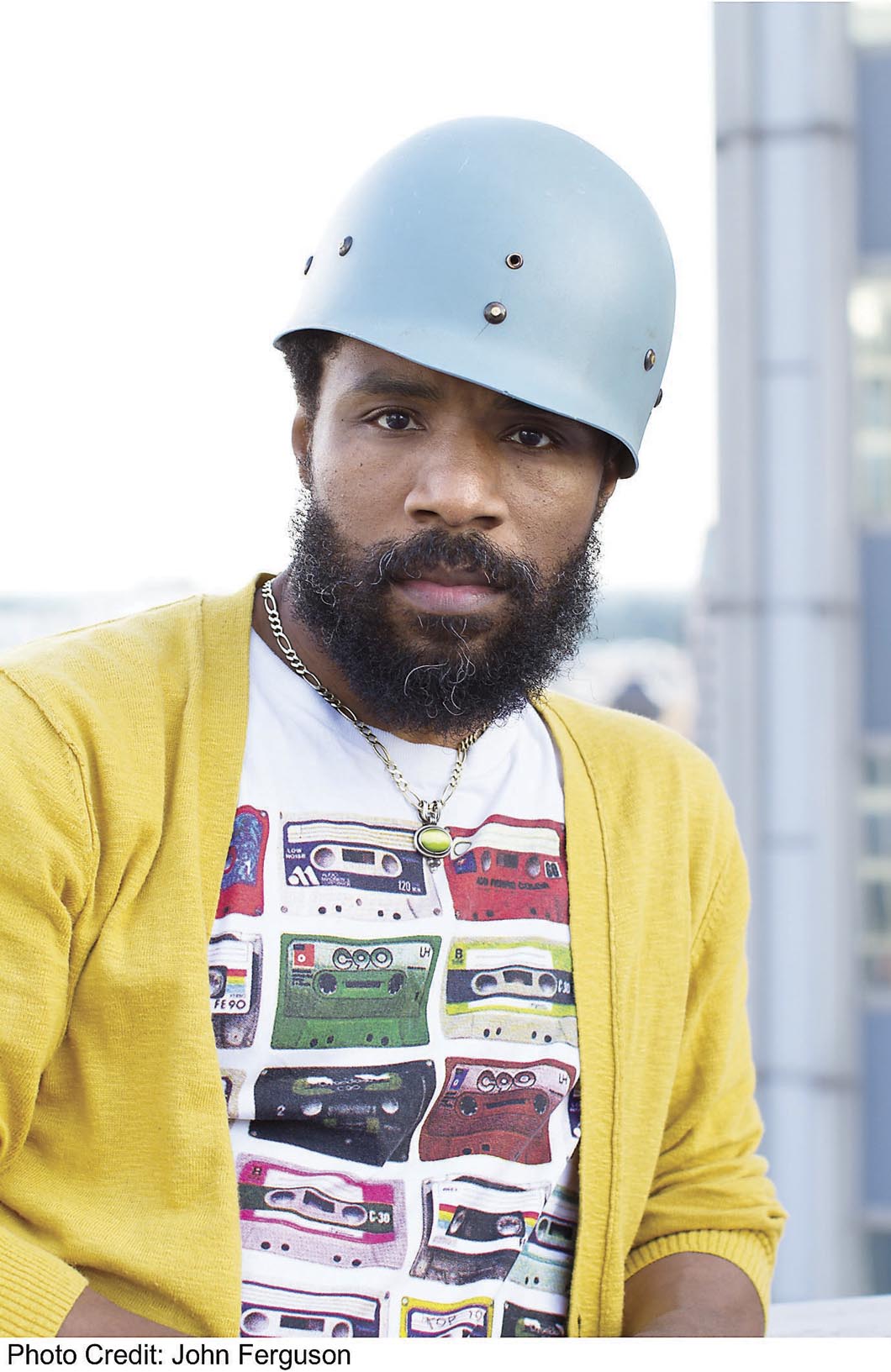IF YOU GOWhat: Nightfall concert series featuring Cody ChesnuTTWhen: 8 p.m. Friday, May 17; Summer Dregs opens at 7 p.m.Where: Miller Plaza, corner of M.L. King Boulevard, Market and Cherry streetsAdmission: FreePhone: 423-265-0771Venue website: www.nightfallchattanooga.comArtist website: www.cchesnutt.comTHE OPENERSummer Dregs is a local indie pop band consisting of veteran local musicians Carl Cadwell (keys), Josh Green (drums), Travis Knight (bass) and Stephen Nichols (vocals/guitar) and occasional backing vocalists Mary Higgins and Nikki Ellis. For more information, visit the band's Facebook profile at Facebook.com/SummerDregs.DISCOGRAPHY2002: "The Headphone Masterpiece"2006: "Black Skin No Value" (EP)2012: "Landing on a Hundred"
In a sense, Cody ChesnuTT is as much an emotional exhibitionist as a neo-soul singer with a vintage sound that's as smooth as crushed velvet.
As he sings in a Teflon-coated tenor that's immediately reminiscent of Marvin Gaye, the Atlanta musician says his greatest artistic goal is to keep his songs simple but honest. Through that simplicity, he says, he hopes to bring back music that people can connect with, a quality he says has become increasingly rare in modern music.
"There's this whole robot thing that's dominating the landscape, and I think that becomes a huge distraction," he explains. "My music is about connecting on a human level again and feeling something -- really feeling something."
Music with feeling, with soul and flair, has been at the heart of ChesnuTT's artistic universe since he was a child listening to Motown artists on the radio.
At his first public performance in Atlanta opening for his uncle's band, a then-13-year-old ChesnuTT sang three songs. Two of them -- Lionel Richie's "All Night Long" and Michael Jackson's "Thriller" -- were his own selections, but it was his father's suggestion of a deep soul cover of Otis Redding's "Mr. Pitiful" that won over the crowd, he says.
"My father thought [that] would kill them," he says, laughing. "[He] was right, though. They absolutely loved Otis Redding."
Practically from that moment, ChesnuTT says, he knew music was his calling. He pursued it into his 20s, when he and his band, Crosswalk, landed a deal with Hollywood Records. Just as they finished their first album, however, the label dropped the band. While the experience soured many of his bandmates on pursuing music for a career, ChesnuTT kept composing.
While living in Los Angeles, he often would call his wife to express his frustration with the industry and the uncertainty of his chosen path, but whenever doubt struck him most fiercely, he remembered his uncle's advice to "not stop writing."
"I had to trust that and trust my own spirit and passion and create from that place," he says. "I figured that eventually it would lead me to where I needed to be. It was my faith."
In 2002, he finally released a two-disc debut, "The Headphone Masterpiece," which drew a great deal of attention, including a headline-grabbing collaboration with The Roots. After a decade of silence, he released the follow-up, "Landing on a Hundred," a collection of passionate and introspective songs about finding himself and learning to be a father.
Friday, May 17, ChesnuTT will take the stage at Miller Plaza as this week's Nightfall series headliner. When he does, he says, the songs of "Landing on a Hundred" will still hit plenty hard, even without the benefit of the nine-piece backing band he had in the studio.
"The song is the song, and in any context, I'm really trying to line up with the emotion of it," ChesnuTT says. "The emotion of it never changes; the sentiment is still a genuine part of the equation."
Chattanooga Times Free Press entertainment reporter Casey Phillips spoke with Atlanta-based neo-soul artist Cody ChesnuTT about his love of Parliament, how he got past a botched record deal and what he learned from Nirvana.
Q: Did you grow up in a musical family?
A: I grew up in a totally musical family. My uncles were in a local band. They started out in the doo-wop tradition. There was constantly music around the house. I was always exposed to people expressing themselves musically, either performing or listening to it. I ended up opening up for my uncles' group, which my father managed. I was 13. That was my first professional gig, actually.
Q: Where was that first show at? What did you sing?
A: It was in Atlanta in a hotel. They've changed the name now, but it was right beside Fulton County Stadium. It was called the Stadium Hotel. That was the first time I hit the stage with a band and the whole production. I had three songs. I opened up with an Otis Redding tune, believe it or not - a song my father thought would kill them. I did "Mr. Pitiful" by Otis Redding. After that, Lionel Richie was big in the '80s, I did "All Night Long" by Lionel Richie. [Laughs.] My big closer was "Thriller." My father was right, though. They absolutely loved Otis Redding.
Q: When did you start singing?
A: That came really early on. I was probably around 8 or 9 when I discovered that form of expression. I could hear my voice and started reaching to sound like things I heard on the radio around that time.
Q: Who were some of the artists you remember hearing on the radio and wanting to sound like?
A: Just like everyone else in the world, it was Michael Jackson, man. At that age, he was the brightest thing in the world. I was all about The Jackson 5 and the other stuff from Motown. And Parliament. I was thinking about this a couple of months ago. It's amazing how Parliament was in my head. In second grade, I remember being crazy about "One Nation Under a Groove." All those kinds of tunes. Back then, they played so much on the radio that it could have been anything, but I distinctly remember Michael Jackson, of course, and Parliament.
Q: Listening to your music, one of the first people who comes to mind is Marvin Gaye. Was he an influence on you?
A: Oh, for sure, but I think that came later in life. I enjoyed all the earlier Motown music and his music along with The Temptations and everyone else. The early tunes just kind of passed by. I knew it was great music, but it wasn't until my early adulthood - like 25 or 27 - that I really started picking up on the depth of his music and what he was able to do as an overall artist. That was part of my training, I would say, for sure, as I evolved as an artist, listening to him and Stevie Wonder.
Q: You play guitar, too. When did you pick that up?
A: That came really late. I started playing guitar when I was 24 or 25, something like that. That was out of frustration because whenever I went to other musicians to express an idea in my head, they would never quite get it. They would get pretty close to the idea, but it felt like what I heard in my head. So I thought, "If I'm ever going to do this, I need to learn to communicate my ideas better," so I picked the guitar up. At that point in time, Nirvana was huge. For a lot of people, Kurt made it very simple again, just guitar and vocals expressing something from the heart. That was a big inspiration, in terms of finding the power in the simplicity of it all.
Q: Speaking of simplicity, "The Headphone Masterpiece" embodies a pretty lo-fi aesthetic. Was that directly influenced by your appreciation of Kurt Cobain and Nirvana's approach?
A: Yeah, it definitely inspired me to keep that raw emotion alive. That, then, gave me the comfort in moving forward in that way. The band I was with at that point in time - right before "Headphone Masterpiece" came out - my drummer was a big Elliot Smith fan. He always talked about Eliot Smith records, and I found that Eliot Smith aesthetic interesting. All that was a big influence on trying to find the maximum impact in a very simple way.
Q: So how large is your backing band on the road? Do you keep the lineup pretty small, or do you go all out and replicate the studio sound?
A: Well, I've had to keep it tight and simple because of the economics of it. It's expensive to take a lot of people on the road. It started out with the band that recorded the record, which was a total of nine, but I've scaled it back to four to create a strong rhythm section. The music still holds up acoustically with a piano or guitar, so anything else is extra. All the other musical elements - the horns and that sort of thing - I really miss them, but the band members try and fill some of that in. The keyboardist and bass player sing harmony with me, so we tend to make it work.
Q: Do you relate to the songs differently without the benefit of all the studio tools and tricks to play with?
A: No, no, it's still the same because the song is the song, and in any context, I'm really trying to line up with the emotion of it. The emotion of it never changes; the sentiment is still a genuine part of the equation. I just hold on to that, regardless of how the concept has expanded. I try to focus on the initial point of inspiration and carry that with me in any performance, be it studio or live.
Q: In the intro to "Landing on a Hundred," you mention that the album was supposed to reflect your life during the 10 years separating it from your first album. Was that something you set out to do or did you realize during the recording process that that was what you were doing?
A: No, it naturally reflected the time, but I wanted a body of work - my next body of work - to represent the journey. I wasn't sure how it would come out, but it happened naturally. I set out on the path to grow as a person and as a human being and as an artist, and I wanted the music to reflect that. That's how the music came out. Looking back on it, it summed that period up perfectly for me because I did a lot of self-examination, a lot of listening and observing life in my own environment and the things around me as well. I wanted to take snapshots of it all and see if I could let the music truly represent it.
Q: When did the writing process for "Landing on a Hundred" start? Were you writing it for 10 years or closer to when you went in the studio?
A: Well, the writing process really started happening four or five years ago. Some of it was looking back; some of it was picking up where I was. I drew from a lot of experiences I had earlier. For the first song, "Til I Met Thee," I had to think back to what it felt like when I first decided to make that transition - in 2003 or 2004 - to live life in a different way and really get to know fatherhood. I looked back on all those things and thought about how it impacted my life. That helped me shape the content of "Til I Met Thee." Then, the other stuff started coming from thoughts I had during that period - what was happening in my life and relationship and monitoring what was happening in media and culture.
Q: What do you want people to take away from your music? What should they walk away with after listening to these songs about your life?
A: To me, it's very simple. The human condition is what I'm going for. I want to tap into everything on a human level. I want the music to touch people in a very sincere way. That's why we love music so much, because it reminds us of our own humanity and our own journey, so to speak. More than anything, I want the music to make people feel human again. There's this whole robot thing that's dominating the landscape, and I think that becomes a huge distraction. Sometimes, we suppress our emotions and hide behind different gadgets. My music is about connecting on a human level again and feeling something, really feeling something.
Q: If "Landing on a Hundred" offered a chance for you to be retrospective and consider the decisions you've made and how they've affected you, did you have any epiphanies about yourself in the course of writing the record
A: Well, if there was an epiphany at all, it was that I didn't realize that I was so unaware of so many things, culturally, politically and spiritually. I had a huge awakening into my own consciousness. I realized that I had really been in the dark. There was so much I hadn't forced myself to learn. I was surprised that there was so much I didn't know and didn't realize it was necessary to know. I would touch on read. It just blew me away that these were the different things that shape our reality without us knowing it. More than anything, . I became more aware of that.
Q: You had a pretty big set back with Hollywood Records after they nixed the deal to release your first record with the band Crosswalk. Instead of becoming discouraged and giving up, though, you pursued things independently to work on what would become "The Headphone Masterpiece." What motivated that decision?
A: Some of my band members did give up. My bass player became a film maker because he became so jaded with the music business. I can understand that choice. For me, I felt like this was something I was born to do. I would talk to my wife periodically out of frustration and I didn't know what the next phase would be, but I felt compelled to move forward. Giving up was never an option. It was all about finding a way to move forward. My uncle was always encouraging me to continue writing. Any time there was doubt, I would reflect on those words. I had to trust that and trust my own spirit and passion and create from that place. I figured that eventually it would lead me to where I needed to be. It was my faith.
Q: Your second LP, "Landing on a Hundred," came out last year on One Little Indian Records. Was it difficult to trust a label again after being burned the first time?
A: No, because it was a different situation. It was just licensing, so I'm not completely at their mercy. That experience with Hollywood Records definitely shaped how I perceive the industry and made me skeptical about the whole thing. WE began selling it first at shows and then online. That was during the days that Napster was building up. All that was still relatively new. We kind of got in on it at the very early stages of it, so I'm not surprised that things are the way they are now. When I started thinking about releasing another record, I began exploring different models. I went into this project to .
Q: Do you feel like you made the right decision?
A: Oh for sure. I still have the freedom to do whatever I want to do, but I also have label relationships.
Contact staff writer Casey Phillips at cphillips@times freepress.com or 423-757-6205. Follow him on Twitter at @PhillipsCTFP.


